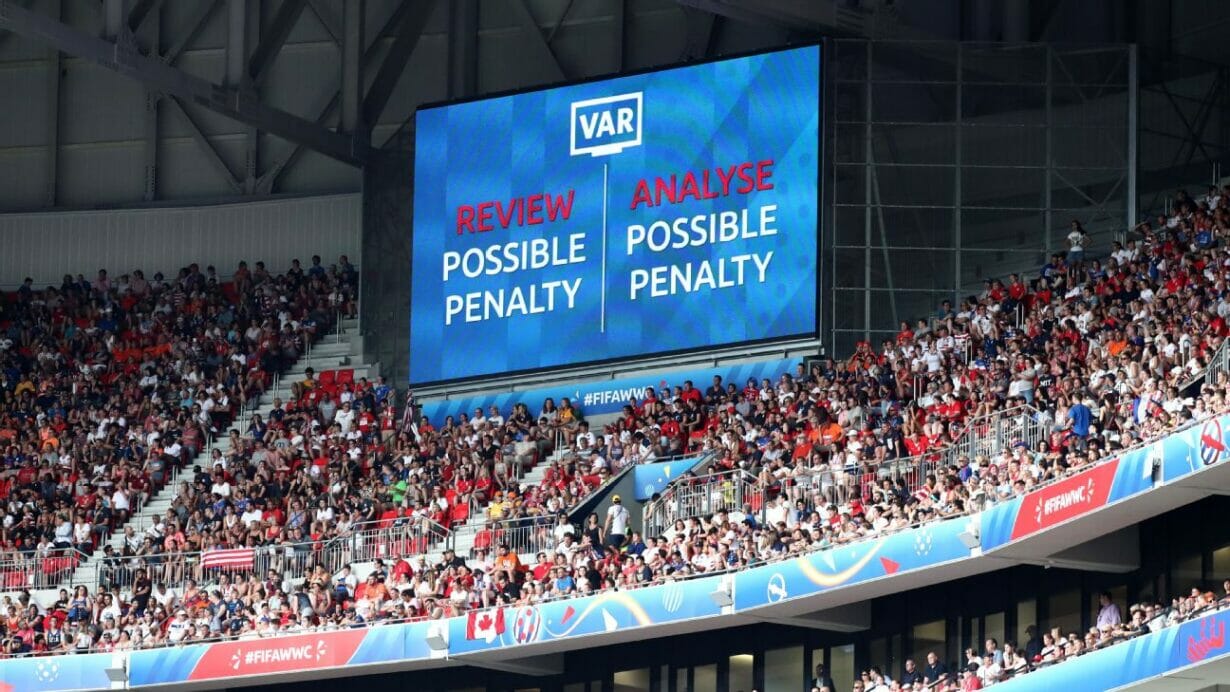
 VAR at the Women’s World Cup may look and feel very different as FIFA trials a new method of keeping the fans informed about decisions.
VAR at the Women’s World Cup may look and feel very different as FIFA trials a new method of keeping the fans informed about decisions.
Here, we take a look at how it will work, and how effective it might be.
How will VAR be different?
Until this year, fans had to rely on messages put on the big screen in the stadium, or the commentator on television working out what the referee had decided.
FIFA has embarked on a yearlong trial of referees announcing the outcome when the VAR has sent them to the monitor.
After watching the replay, the referee will make the TV sign and then say how play will restart, and any possible sanctions such as a red card. This will be heard by the fans in the stadium and those watching on TV.
Is it new for the Women’s World Cup?
No. FIFA held initial tests during the Club World Cup in February and the Under-20 World Cup in June.
But this will be the highest-profile event it has been used in.
What will it sound like?
FIFA has released two video examples. The very first time it was used was in a Club World Cup game between Al Ahly and Flamengo, when referee Mustapha Ghorbal had mistakenly awarded a penalty to the Brazilian side for a foul by Khaled Abdelfattah.
After visiting the monitor, it was clear the foul challenge had taken place outside the area.
The referee announced: “Decision is no penalty. Contact outside. Direct free kick. Red card for No. 2. Denying an obvious goal-scoring opportunity.”
The second example is from an Under-20 World Cup game between Argentina and Uzbekistan.
Referee Francois Letexier had awarded a penalty to Uzbekistan in the 29th minute for a foul by Agustin Giay on Makhmudjon Makhamadjonov. However, it was immediately obvious to the VAR that the defender had won the ball before making contact with the attacker.
Letexier announced: “After on-field review, the final decision is no penalty. The ball is clearly played first. Restart by dropped ball.”
Will it help fans’ understanding?
This will depend how much detail a referee gives.
In the first example, Ghorbal gave very little context as to why he had shown a red card after canceling the penalty. The reason is the double-jeopardy exemption for a red card applies inside the box only, and the foul being outside led to the yellow being upgraded to red. Some fans would understand this, but not all, so it doesn’t give total clarity.
Letexier, however, was clearer in saying the ball had been won — though this was much more straight forward to explain.
It shows that this is likely to help only on straight-forward VAR reviews, and we know many can be complicated.
Added to that, some referees will naturally be better at explaining their decisions than others.
All announcements at the Women’s World Cup will be made in English.
This means we won’t get to hear the referee talking to the VAR?
No, FIFA says it doesn’t believe that broadcasting the discussion when the referee is at the monitor is the way to bring fans into the process.
This is pretty much like NFL?
Yep. The referee will say a few sentences to explain what has happened.
It’s not like cricket or rugby union, where the fans are able to hear the whole review process.
What if the referee doesn’t visit the monitor?
Fans won’t be given additional information if after a lengthy check by the VAR the referee isn’t sent to the monitor.
In this situation, supporters will still have to rely on messages on the big screen, or their TV commentator.
Is this going to work?
It’s really a halfway house between the previous system, where decisions would be displayed only on the big screen, and giving the fans what they truly want — the audio between the officials so they can fully understand the process. There is no sign that FIFA is prepared to entertain the latter at the present time, and it will remain against VAR protocol in all competitions.
Supporters will still be left in the dark when a referee’s decision isn’t changed by the VAR, so we’re some way off a solution that truly brings the fans into the process, whereby they don’t feel detached.
Will we see this in leagues like the Premier League?
Right now it’s just a trial in FIFA competition, so domestic leagues and competitions can’t try it out themselves.






